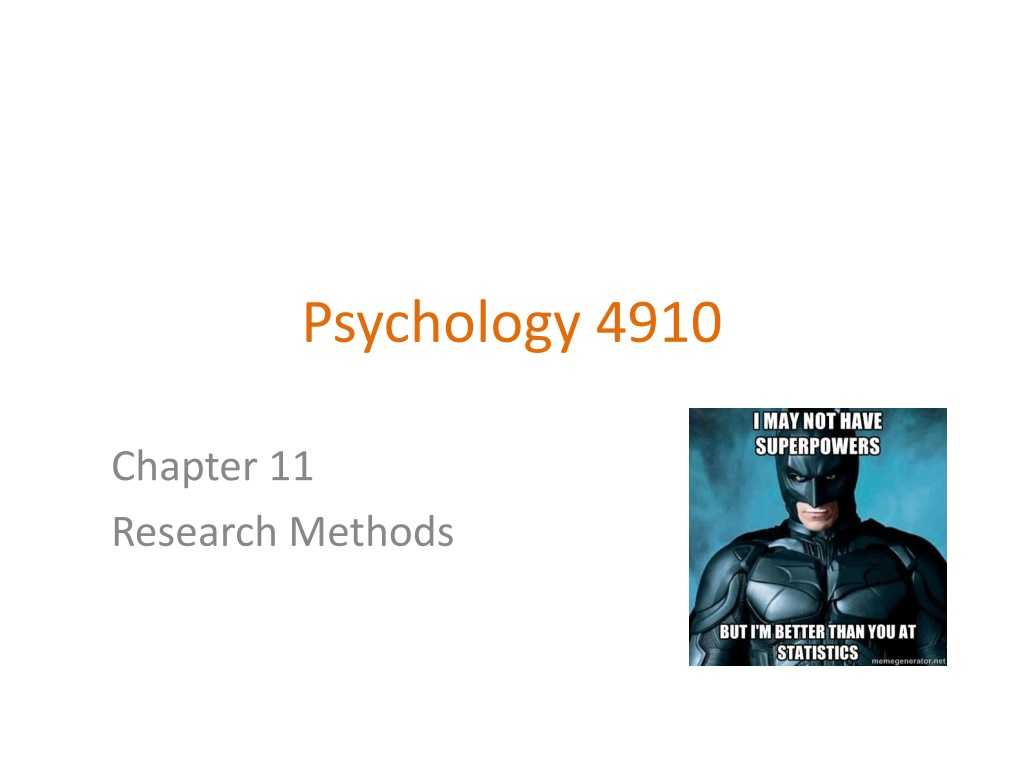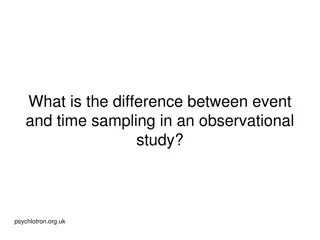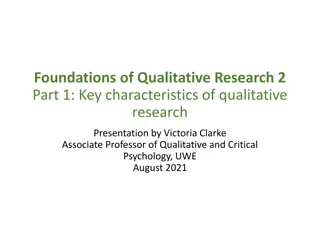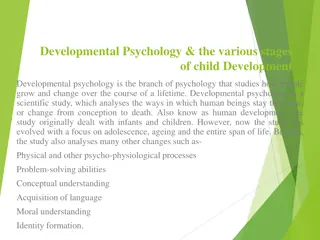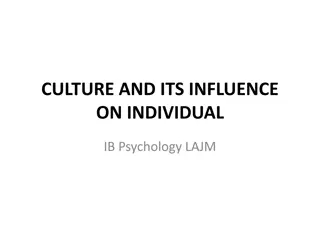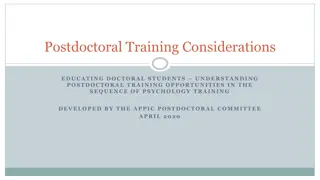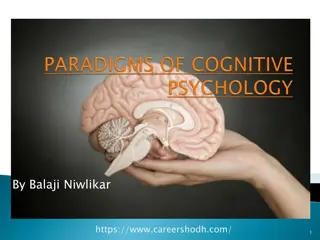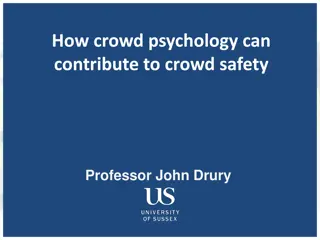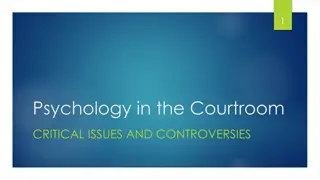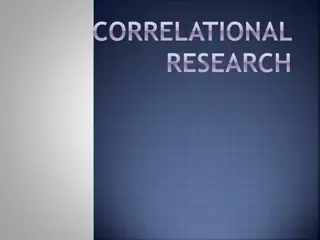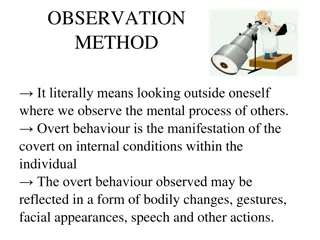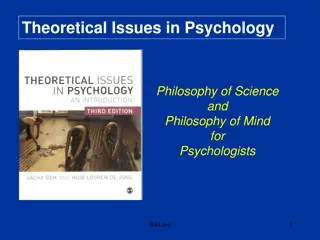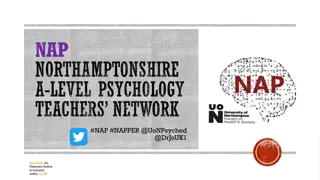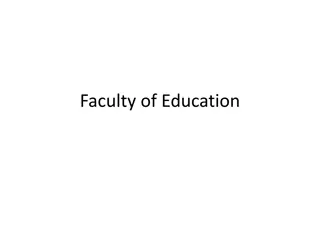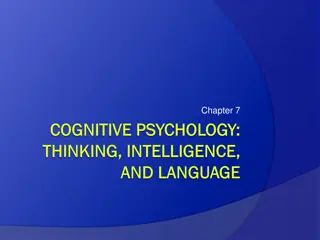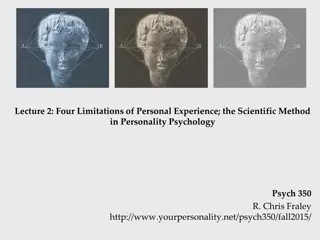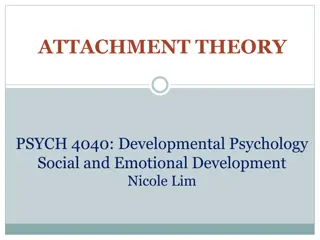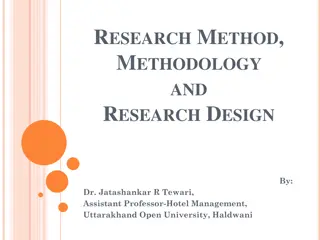Evolution of Research Methods in Psychology
The evolution of research methods in psychology is marked by significant developments such as introspection in the 19th century, logical positivism in the 1920s, and the emphasis on falsifiability and operational definitions. This evolution influenced how psychologists approached gathering knowledge, with behaviourists and neo-behaviourists embracing logical positivism while psychoanalysts faced criticism. The shift towards objective verification and observable occurrences has shaped the field's scientific rigor.
Uploaded on Sep 22, 2024 | 0 Views
Download Presentation

Please find below an Image/Link to download the presentation.
The content on the website is provided AS IS for your information and personal use only. It may not be sold, licensed, or shared on other websites without obtaining consent from the author. Download presentation by click this link. If you encounter any issues during the download, it is possible that the publisher has removed the file from their server.
E N D
Presentation Transcript
Psychology 4910 Chapter 11 Research Methods
Introduction Nineteenth century Introspection Behavioural observation Early twentieth century Logical positivism Statistical methods Methods for experimental vs. non-experimental data
Logical Positivism 1920s: Group of physicists, logicians, and mathematicians called the Vienna Circle Tried to formulate general principles for gathering knowledge Drew upon disciplines like physics and chemistry
Logical Positivism Rudolf Carnap Knowledge is embodied in language Science lies at the bottom of a set of statements referring to observations Truth or falsehood of statement must be objectively verified How to verify these statements? Verification principle: Meaning of a statement is its method of verification
Logical Positivism Carnap: Protocol sentences Refer to publicly observable events Should be used when we do experiments Meaningful statements can be translated into protocol sentences
Dispositional Concepts Dispositional concepts: Descriptions of lawful relationships between IVs and DVs If X then Y, where X is a stimulus and Y is a behaviour Principle of falsifiability became crucial criterion for separating scientific approaches from non-scientific ones Heavily influenced by philosopher Karl Popper
Operationism Operationism: View that all psychological concepts ultimately refer to publicly observable occurrences Attributed to physicist Percy Bridgman Operational definitions: Specify how a concept is measured Ensure that psychological concepts refer to publicly observable events
Where Did Psychologists Stand? Behaviourists & neo-behaviourists Welcomed logical positivism and operationism Gestalt psychologists Damaged by the new philosophy of science Psychoanalysts Received much criticism from adherents of logical positivism/operationism
Criticisms of Operationism Sigmund Koch (1917 96): Some psychologists went overboard with operational definitions Operationism is not a way of creating psychological concepts Context of discovery vs. context of justification
Experimental Methods Statistical Inference Early experiments: Detailed descriptions of individual cases No explicit rules for making generalizations Relied heavily on subjective interpretation Some did use graphs to represent their data e.g., Ebbinghaus, Thorndike
R.A. Fisher (18901962) Fisher s Approach to Designing Experiments Random order: Determined by a purely chance procedure Possible to determine how likely participant is to make correct choice by chance alone How much chance is acceptable? Fisher suggested criterion of one chance in 20 (5%)
R.A. Fisher (18901962) The Null Hypothesis Assumption in an experiment that any differences between experimental conditions are due only to chance Null = no difference Can never prove the null hypothesis; only possible to disprove it Controversial concept Falsifying the null hypothesis does not verify an alternative hypothesis
R.A. Fisher (18901962) The Null Hypothesis, cont d Fisher: 5% level of significance was arbitrary Still, many psychologists adopted it as article of faith End of 1950s: Goal of psychological research = Achievement of statistical significance (p = 0.5) Fisher: Statistical significance is no substitute for repeatability Lack of replication continues to be an issue in psychology
Correlational Methods Utilize the same underlying principles as experimental designs Typical correlational experiment: Obtain different measures on a set of participants Examine strength and direction of relationships between variables
Charles Spearman (1863-1945) Worked with Cyril Burt Laid groundwork for factor analysis Begins with a set of correlations between a number of measures Statistical procedures for deriving a number of underlying factors to describe the structure of the set of correlation coefficients
Charles Spearman (1863-1945) Two-factor theory of intelligence Derived from Spearman s factor analysis of different tests of mental abilities Every individual measurement of every ability divided in two parts: 1. General intelligence factor, g Represents amount of mental energy available to an individual 2. Specific factor, s Represents abilities needed to succeed in certain subjects g French English Math Music
Charles Spearman (1863-1945) Specific abilities tend to be strongly (but not perfectly) correlated Those who perform well in one subject tend to perform well in others Each specific ability determined by g, and by circumstances specific to that skill g shaped by genetics, but s could be shaped by education
Louis Leon Thurston (1887-1955) Developed factor-analytic techniques in the United States Wanted to uncover a set of mental abilities that were independent of each other De-emphasized importance of g More important to examine person s profile of abilities than to summarize intelligence with a single number
Louis Leon Thurston (1887-1955) Primary mental abilities 1. Verbal (e.g., learning vocabulary) 2. Number (e.g., doing arithmetic) 3. Spatial (e.g., identifying a design) 4. Word fluency (e.g., thinking of words of a particular type) 5. Memory (e.g., remembering a series of digits) 6. Reasoning (e.g., following a rule)
Lee J. Cronbach (1916-2001) APA Presidential Address Reviewed development of research methods in psychology Saw psychology as two distinct methodological approaches: 1. Experimental psychology 2. Correlational psychology
Lee J. Cronbach (1916-2001) Used model to represent methodological distinctions existing in psychology around mid 20th-cen. Data gathered by Thorndike Laboratory data vs. field data Laboratory experiments vs. differential studies Quantitative vs. verbal Psychologists who rely on numbers vs. those whose medium is language
Lee J. Cronbach (1916-2001) Methodological differences had resulted in groups consisting of: personality, social, and child psychologists perception and learning psychologists Experimenters concerned with effects of particular treatment on behaviour May feel lack of control over all relevant variables
Lee J. Cronbach (1916-2001) Correlational psychologists concerned with the fact that all participants do not respond in the same way to the same treatment Applied psychology improves decisions about people
Qualitative Research Methods Quantitative research methods: Aggregate objects, events, or persons under study to make general statements about people as a whole Rely more heavily on statistics Qualitative research methods: Designed to develop description of the way individuals represent the world they live in Rely more heavily on language, storytelling
Qualitative Research Methods Gained favour at end of twentieth century Approach involves: Discovery-oriented analysis of verbal text Small sample sizes Discursive psychology: Studies how people ordinarily report, explain, and characterize actions and events
